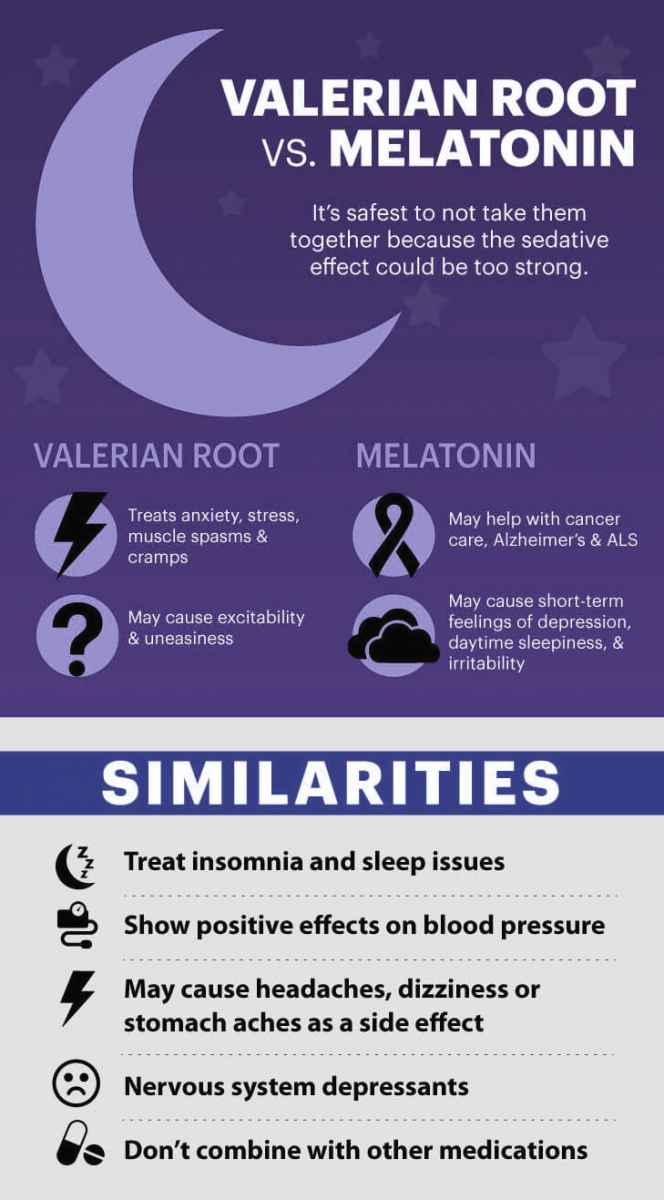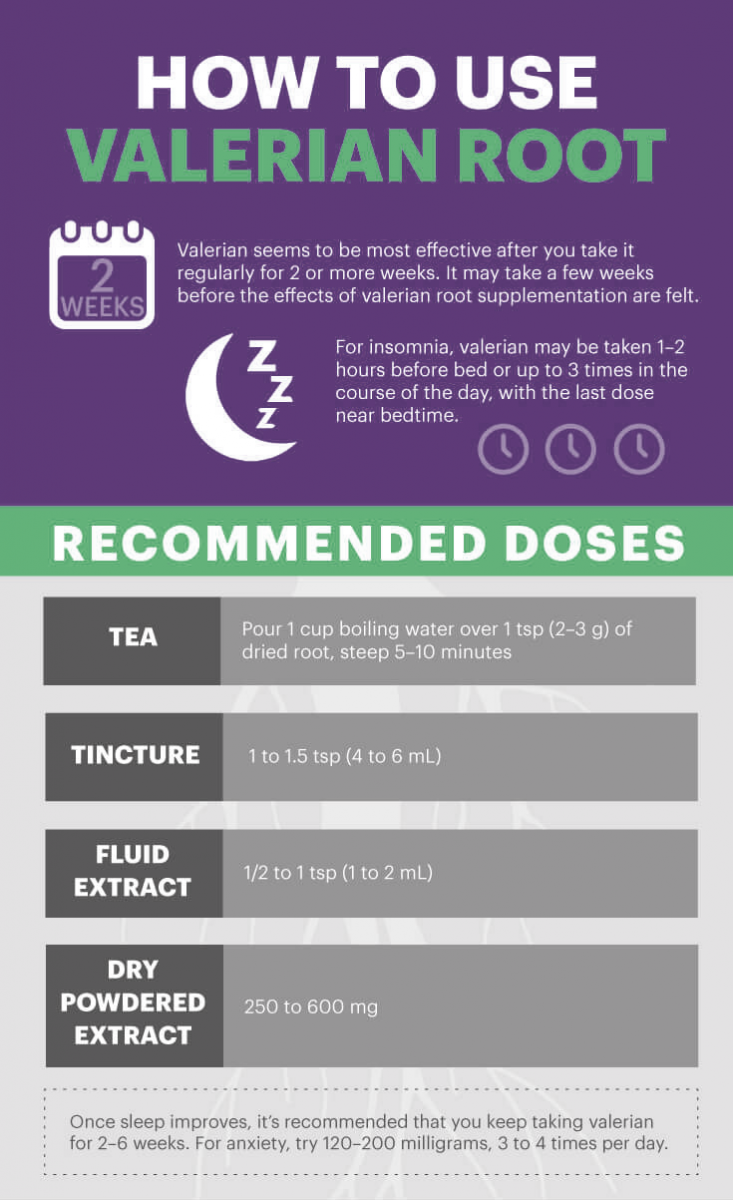Valerian Root Solves Insomnia, Helps with Anxiety and Lowers Blood Pressure
Valerian Root Solves Insomnia, Helps with Anxiety and Lowers Blood Pressure
Do you suffer from insomnia or just sick and tired of not getting a decent night’s sleep? Did you know that there’s an herb that has been used to ease insomnia, anxiety and nervous restlessness since the second century A.D.? This natural and herbal sleep aid is called valerian root.
is widely used and respected by the general population and physicians for its sedative effects and anti-anxiety capabilities.
You may have even had valerian root before and not even realized it. It’s very common for valerian root to be included in sleep-promoting tea blends, but it doesn’t just offer a solid night’s sleep — it’s also amazing at naturally calming anxiety and can even lower blood pressure, among other tremendous benefits:
1. Naturally Aids Sleep
Studies show that valerian reduces the time it takes to fall asleep and improves the quality of sleep, so if you can’t sleep, it may be just what you’re looking for. Unlike many prescription sleeping pills, valerian has fewer side effects and is a lot less likely to result in morning drowsiness.
In one double-blind study conducted by the Foellinge Health Center in Sweden, the effects of valerian on poor sleep were significant. Of the study participants, 44 percent reported perfect sleep while 89 percent reported improved sleep when taking valerian root. In addition, no side effects were observed for this group.
, to treat insomnia. In one study of children with minor sleep problems published in Phytomedicine, 81 percent of those who took an herbal combination of valerian and lemon balm reported sleeping much better than those who took a placebo.
Why can valerian root help you sleep so well? Valerian extract can cause sedation is by increasing your brain’s GABA level. GABA is an inhibitory neurotransmitter, and in large enough quantities it can cause a sedative effect.
Results from an in vitro study suggest that valerian extract may cause GABA to be released from brain nerve endings and then block GABA from being taken back into nerve cells. In addition, valerian’s valerenic acid inhibits an enzyme that destroys GABA, another way that valerian can improve your GABA levels and promote a great night’s rest.
2. Calms Anxiety
Scientists have found that valerian root increases the amount of a chemical called gamma aminobutyric acid (GABA) in the brain. GABA helps regulate nerve cells and calms anxiety. Drugs such as alprazolam (Xanax) and diazepam (Valium) also work by increasing the amount of GABA in the brain. The valerenic acid and valerenol contained in valerian root extract act as anti-anxiety agents.
It’s pretty amazing that a herbal remedy like valerian root can have the same anti-anxiety effects of prescription drugs without all the serious side effects of psychotropic drugs.
3. Lowers Blood Pressure
Now that you know that valerian root can be so calming to the mind and body, it’s probably not surprising to hear it can also help lower blood pressure, improving heart health. The same active components that make valerian root so effective for stress and anxiety management can also help the body properly regulate its blood pressure.
High blood pressure is something you definitely want to avoid since it increases the chance of stroke and heart attack. Valerian root supplements can help naturally reduce blood pressure and keep it at a healthy level, which has a direct positive impact on your heart health.
4. Eases Menstrual Cramps
The relaxing nature of valerian root can make it a smart choice for natural relief of menstrual cramps. It can reduce the severity and discomfort of menstrual cramps, which is a common problem for women who suffer monthly from PMS.
How exactly can valerian root help? It’s a natural sedative and antispasmodic, which means it suppresses muscle spasms and acts as a natural muscle relaxer. Valerian root can effectively calm the severe uterine muscle contractions that cause the terrible pain many women experience during menstruation, as a double-blind, randomized, placebo-controlled study from Islamic Azad University in Iran showed.
5. Improves Stress Management
By reducing anxiety and improving the length and quality of sleep, valerian root can significantly help with daily stress management. Chronic stress can make you feel anxious, but anxiety can also make you feel more stressed out.
By improving GABA levels, valerian makes it easier for both the mind and body to relax. Since relaxation is the antithesis of stress, valerian root is an excellent natural way to help keep your stress down and your quality of life up.
Further, valerian root has been shown to suppress both physical and psychological stress, according to research in BMC Complementary and Alternative Medicine.
Valerian vs. Melatonin
Melatonin is a hormone made in the pineal gland and is highly correlated with the body’s sleep-wake cycle. When the sun goes down and darkness occurs, the pineal is “turned on” by the SCN and begins to actively produce melatonin, which is released into the blood.
Usually, this occurs around 9 p.m. As a result, melatonin levels in the blood rise sharply and you begin to feel less alert. Sleep becomes more inviting. Melatonin levels in the blood stay elevated for about 12 hours — all through the night — before the light of a new day when they fall back to low daytime levels by about 9 a.m. Daytime levels of melatonin are barely detectable. Low melatonin levels are linked to insomnia.
Valerian is a sedative herb that has been used for centuries for the treatment of insomnia. Valerian increases GABA levels in the brain, helping reduce brain activity and allowing users to fall asleep more easily. Gamma-amino butyric acid (GABA) is an amino acid that acts as a neurotransmitter in the central nervous system. It inhibits nerve transmission in the brain, calming nervous activity.

Benefits:
Both melatonin and valerian are used to treat insomnia and sleep issues. Both have shown positive effects on blood pressure.
Valerian is also recommended to treat anxiety, stress, muscular spasms and cramps.
Melatonin is being investigated to help with cancer care (improve response rates, survival time and quality of life). Melatonin also shows promise for Alzheimer’s disease (AD) and amyotrophic lateral sclerosis (ALS, also known as Lou Gehrig’s disease).
Possible Side Effects:
Valerian — headache, dizziness, stomach problems, excitability, uneasiness
Melatonin — headache, short-term feelings of depression, daytime sleepiness, dizziness, stomach cramps, irritability
Supplement Interactions:
Valerian — Severe tiredness can result if combined with supplements with sleep-inducing properties.
Melatonin — Use caution when combining melatonin with supplements that slow blood clotting and those with sedative properties.
Valerian and melatonin — The safest bet is not to take them together because the combined sedative effect could be too strong. Both are considered to be nervous system depressants, producing a sedating effect as they promote sleep. You shouldn’t take melatonin with any other type of sedative, because it may be unsafe.
It’s also best not to combine either melatonin or valerian with any other over-the-counter or prescription sleep aids, or any products containing alcohol.
Valerian Root Origin and Chemical Properties
Valerian root is derived from valerian (Valeriana officinalis), a perennial flowering plant from the Valerianaceae family. The plant has sweetly scented pink or white flowers that bloom in the summer. Valerian (often misspelled “valarian”) is native to Europe and parts of Asia and now grows in North America as well.
Valerian root contains volatile oils, including valerenic acids, less volatile sesquiterpenes and valepotriates (esters of short-chain fatty acids). These active constituents are likely responsible for valerian root’s ability to produce a calming and restorative effect on the body’s central nervous system.
The name of the herb is derived from the personal name “Valeria” and the Latin verb “valere” (to be strong, healthy). Valerian has been used as a medicinal herb since at least the time of ancient Greece and Rome. Hippocrates described its properties, and Galen later prescribed it as a remedy for insomnia. In medieval Sweden, it was sometimes placed in the wedding clothes of the groom to ward off the “envy” of the elves.
How to Use Valerian Root
Valerian has been classified as generally recognized as safe in the U.S. Valerian root can be purchased as a supplement in a variety of forms online or at your local health food store. It’s sold as a dry powdered extract in capsule form, a tea, tincture or fluid extract. Valerian can also be used externally in essential oil form.
I’ll warn you now so you’re not surprised — valerian root smells pretty terrible, but thankfully it doesn’t taste as bad as it smells.
Valerian seems to be most effective after you take it regularly for two or more weeks. It may take a few weeks before the effects of valerian root supplementation are felt.
For insomnia, it may be taken one to two hours before bed or up to three times in the course of the day, with the last dose near bedtime. What’s the best valerian root dosage for insomnia? Recommendations can vary slightly, but for insomnia, it can be taken in the following forms at these recommended dosages:
Tea: Pour 1 cup boiling water over 1 teaspoonful (2 to 3 grams) of dried root, steep 5 to 10 minutes.
Tincture (1:5): 1 to 1 1⁄2 teaspoon (4 to 6 mL)
Fluid extract (1:1): 1⁄2 to 1 teaspoon (1 to 2 mL)
Dry powdered extract (4:1): 250 to 600 milligrams
Once sleep improves, it’s recommended that you keep taking valerian for two to six weeks. For anxiety, try 120 to 200 milligrams, three to four times per day.

Possible Side Effects & Caution of Valerian Root
Although valerian root is generally regarded as safe, side effects such as headache, dizziness or stomach problems can occur. Sometimes people may have a reaction to valerian that’s the opposite of what they were aiming for — feeling anxious and restless instead of calm and sleepy.
Most studies show no harmful effects on fertility or fetal development, but more research is needed. Check with your doctor before taking valerian root if you are pregnant or nursing. You should also speak with a doctor before using valerian root with children.
For the majority of people, valerian root does not seem to cause any kind of dependency. It also does not cause withdrawal symptoms for most people. However, there are a few reports of withdrawal symptoms when valerian has been used over very long periods of time. If you want to stop taking valerian after a lengthy amount of time, then you should lower your dose gradually rather than stopping all at once to be on the safe side.
Since valerian can make you sleepy, do not take valerian root supplements before driving, operating heavy machinery or doing any activities that require alertness. If you have liver disease, avoid taking valerian.
Valerian root may increase the effects of other sleep aids so it’s not recommended to combine valerian with other sleep aids. It should also not be combined with depressants, such as alcohol, benzodiazepines and narcotics since valerian can increase the sedative effect of depressants.
Valerian can also interfere with some prescription medications, and it may interact with or increase the effects of other natural supplements like St. John’s wort, and melatonin. Check with your doctor before taking valerian if you have any chronic health issues, and also check to make sure valerian won’t interact with any of your other current medications or supplements.
Final Thoughts on Valerian Root
Valerian root is a safe and natural way to help with one of the most annoying and common health problems — poor sleep. With minor and rare side effects, it can really trump prescription sleep aids when it comes to its overall effect on your health.
Many prescription sleep aids leave you feeling groggy the following morning, not to mention all the other scary and more serious risks on those long labels. Valerian root works with your body’s chemistry to help get your nightly rest back on track.
In addition, valerian root offers relief for many other common health concerns through its natural sedative abilities. It’s helped many people with:
anxiety
nervousness
tension
stress
menstrual cramps
high blood pressure
So I highly recommend valerian root to treat insomnia and the conditions mentioned. And don’t forget that it might take two weeks before you see results from valerian, but you could also see improvement after just one dose!
via Dr Axe
Be the first to post a message!
